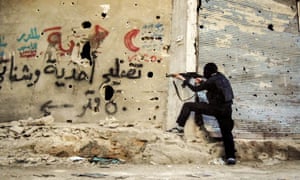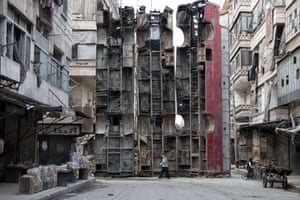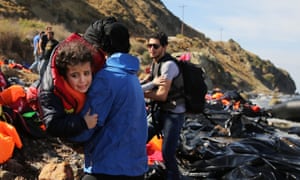Link
The Guardian
As a Syrian Kurd, and like so many young people in Syria, I was taken by surprise by the beginning of the uprising in 2011. It was something that we never thought would happen. I was among those young, enthusiastic people looking for a peaceful change and a more open, pluralistic and inclusive form of governance. But after what started as a peaceful uprising turned into endless violence, in 2013 I fled both the regime and the radicals.
When the winds of the Arab Spring blew eastwards from Tunisia, across Libya and then through Egypt, we in Syria were watching with surprise. The removal of the Tunisian president, Zine El Abidine Ben Ali, had a huge impact on young people and some of us began to think about the direction of those winds.
One day in March 2011, I came back home from university and saw some live footage of a protest taking place in an old market in Damascus – it was the first time I had seen protests in Syria since the unrest led by Kurds in al-Qamishli in 2004. That day, I felt the winds of the Arab Spring arrive in Syria.
Civilians took to the streets demanding economic and political reforms, and protesters asked the government to curb the powers of the secret services. It was a revolution – a real revolution at that time – and it was led by the most admirable and courageous people. Doctors, students, workers, farmers ... people from all walks of life were all united under slogans like “reform”, “integrity”, “pluralism” and “the rule of law”.
During the first days of the uprising, white flags were flown everywhere. We believed that what the Tunisians had been able to achieve within a few days, we could achieve in weeks. But we were wrong. The government claimed that the protesters were armed, that they were targeting the police and the army – a claim most protesters refuted.
Things started to change: more protesters were shot dead or injured, allegedly by the army and riot police. The regime denied targeting protesters. The uprising spread across the whole country but the more it spread, the more casualties it caused.
I had never cared about the news before but I became a news addict. I spent most of the time watching live protests and analysis on Al Jazeera and Al Arabiya. Some of the analysts said it was only a matter of time before President Bashar al-Assad fell, but others said that he would never go.
As I watched the events unfolding, I thought the day had come when Syria would become a country where all people are treated equally, where all people have the same rights and obligations regardless of their political views, religion or ethnicity. I envisioned a new Syria, a place where I could speak my mother language (Kurdish) without being afraid, a place where I could read, write, and practice my beliefs and traditions without fear of being discriminated, arrested, or tortured. This was the vision, but it never materialised.
Two years into the Syria uprising, a new level of violence unfolded. Thousands of people were killed and tens of thousands started to flee their homes during aerial bombardments. People were shocked by this new level of brutality and bloodshed. It was painful for people to see that their own government and army, who were supposed to protect them, had turned against them.
The white flags disappeared from protests and main squares. Secular slogans and chants turned into religious ones. People started becoming more radicalised by the amount of violence they witnessed.
The year 2013 was one of the most violent in Syria. In my town, Aleppo, we started to see new fighters with long beards and strange clothes. There were rumours that these fighters came from Afghanistan, Chechnya, Libya, Yemen and other parts of the world to fight against Assad. People felt uneasy towards these new strangers who had suddenly shown up to help us solve our problem with our government.
Some of these fighters claimed they had come to help because the international community had not responded. But these strangers brought their own flags with them – black flags. They warned people against secularism and democracy, they asked people to never trust the west and their empty promises, and they urged people to join them and follow their path. Some people did, others rejected them and asked them to go back to where they came from. Months later, these people showed their real colours and removed their masks – they were Isis and Al-Qaida.
Ironically, the same people who claimed to have come to help us get rid of Assad turned into more monstrous killers. They killed and beheaded every person who flew a white flag and practised a secular chant.
That year, I realised that if I stayed in Aleppo any longer I would be in big trouble. The regime wanted me to serve in the military, and if you are on the frontline you have two options; kill your own people, or they will kill you. I chose neither and I decided to leave Syria for a few weeks until things had calmed down. I haven’t been back to Syria since.
After fleeing Syria, I joined the UN and was based in Erbil, northern Iraq, working as a consultant for the Syrian refugee crisis response. Working in the humanitarian field was a great challenge. I met hundreds of my own people, the same people who used to live peacefully in Syria became refugees and are living in appalling situations.
I moved out of Iraq after it was hit by a wave of terrorism, resulting in mass displacement in the country which added more to the plight of refugees stuck in camps there. Turkey was my next stop, but by that time fighting between the Turkish army and the Kurds had erupted in the southeast of Turkey. As a Kurd from Syria, it was too risky to seek refuge there.
The spread of terrorism, extremism, conflicts rooted in ethnic and religious tensions, poverty, corruption and the state of constant instability in the Middle East made me choose to move out of that part of the world for a while, and I was among the people who made the perilous journey to Europe during 2015.
This is my story of the Arab Spring – a spring that many argue is nothing but a cruel winter which led to one of the worst humanitarian crises since the second world war. And the victims were us, Syrians, who once had a dream of a free, pluralistic country, but whose dream turned into a nightmare.
Ahmad al-Rashid now lives in the UK.




No comments:
Post a Comment